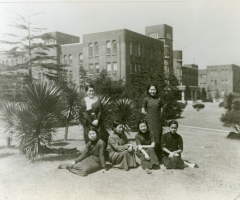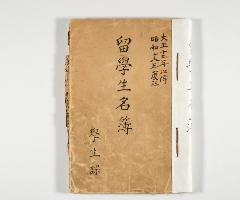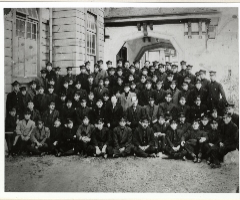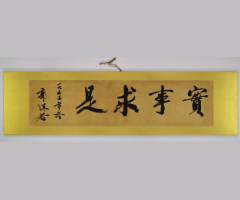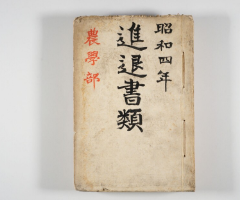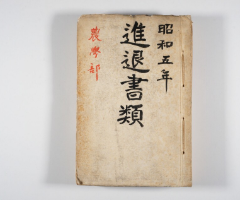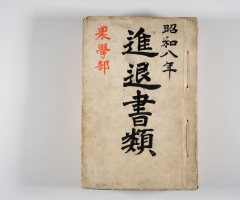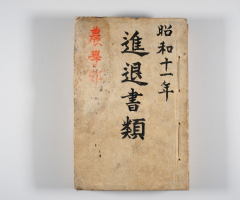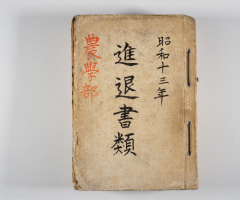- HOME
- Service
- Libraries
- Learning
- Learning
- Education
- Research
- Literature & Information
- Purchasing Research Materials
- Access to Papers
- Reference Management Tool
- Publication of Research Outputs
- Literature & Information
- About Us
Academic Exchange with Asia
International students in the prewar era
Kyushu University’s very first student from overseas was a student from the Korean Empire who, in 1910, enrolled in what was then Fukuoka Medical College of Kyoto Imperial University as an associate student. As Japan annexed Korea just before he enrolled, he was classed not as a foreign international student, but rather as a student from the colonies (overseas territories). However, students from the colonies like him were treated as international students throughout the prewar period.
The first international students from a “foreign country” were three students from China who enrolled in 1913, after the founding of Kyushu Imperial University (two enrolled in the medical college and one in the college of engineering). Students from China accounted for the majority of international students thereafter, followed by those from Korea and Taiwan; after the 1932 founding of the State of Manchuria (Manchukuo), Manchurian students became the most numerous.
One notable international student during the prewar era was Guo Moruo (originally named Guo Kaizhen). Although he enrolled in the medical college in 1918, his greatest passion was literature and he went back home for a time to pursue literary activities, eventually graduating in 1923, a year later than scheduled. He later returned to China, where he pursued a career as an author, historian, and politician.
| Med. | Eng. | Agr. | Law and Lit. | Sci. | Med. School | Total | |
|---|---|---|---|---|---|---|---|
| China | 93 | 69 | 82 | 144 | 0 | 0 | 388 |
| Korea | 15 | 14 | 34 | 144 | 5 | 11 | 223 |
| Taiwan | 34 | 7 | 6 | 20 | 0 | 16 | 83 |
| Manchuria | 2 | 2 | 7 | 19 | 0 | 0 | 30 |
| Other | 2 | 1 | 2 | 3 | 1 | 0 | 9 |
| Total | 146 | 93 | 131 | 330 | 6 | 27 | 733 |
Reference: E. Orita. 2004. "Kyushu Teikoku Daigaku ni okeru ryugakusei ni kansuru kisoteki kenkyu." Grant-in-Aid for Scientific Research (C)(2) Result report, FY2002-2003. (in Japanese)
One notable international student during the prewar era was Guo Moruo (originally named Guo Kaizhen). Although he enrolled in the medical college in 1918, his greatest passion was literature and he went back home for a time to pursue literary activities, eventually graduating in 1923, a year later than scheduled. He later returned to China, where he pursued a career as an author, historian, and politician.
Asian research in the prewar era
Due in part to Kyushu Imperial University’s geographical proximity to Asia, many of its academic staff visited Asia to conduct research activities in various parts of the region. While only a handful went on official visits to Asia each year until the end of the 1920s, the number surged after the Mukden Incident in 1931, with at least 20 making trips every year. In the busiest years, that figure exceeded 100.
They mostly visited China and Manchuria, but quite a few staff members also went to Southeast Asia. The faculties to which the academics belonged were, in most cases, those in which research was primarily conducted via fieldwork, such as the Faculty of Agriculture and the Faculty of Engineering’s departments of mining science and applied chemistry. In addition, there were many academic staff from the Faculty of Medicine, as they not only conducted research, but also provided medical care.
Asian research was suspended for a while following Japan’s defeat in World War Two, but is now flourishing again. These activities in the prewar period laid the foundations for academic exchange with Asia in the present day.
For more information, see the following reference:
K. Fujioka. 2015. "Teikoku daigaku no ajia chosa kenkyu: Kyushu Teikoku Daigaku o chushin ni." Grant-in-Aid for Scientific Research (C) Result report, FY2012-2014. (in Japanese)
Records of official visits made by Kyushu University researchers over the decades are stored in the Kyushu University Archives, providing a valuable source of information for recounting the history of the university’s academic exchanges with other countries. This exhibition features a number of relevant records of this nature, offering background information about academic exchange with Asia.
Submitted:
| Updated:
| Total Views: 1,628
